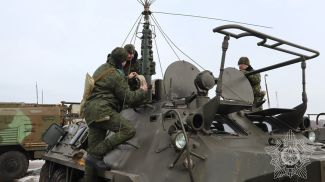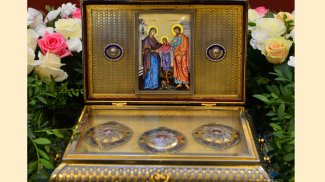MINSK, 5 May (BelTA) – The Great Patriotic War is at the heart of the historical memory of Belarusians, analyst with the Belarusian Institute of Strategic Research (BISR) Svetlana Aleinikova said as she took part in the meeting of BelTA's Expert Community project to discuss the Great Patriotic War in the context of patriotic upbringing.
“Let me cite the data of sociological research carried out by the Sociology Institute of the National Academy of Sciences of Belarus and Belarusian State Economic University at the request of BISR. Speaking about the historical memory of the Belarusian society, we can say that it is rather even: there are no historical stages that are either neglected or made into a cult, like in some other post-Soviet countries. The Great Patriotic War takes the central place in the historical memory of the Belarusian society, which is confirmed by all kinds of sociological research. Belarusians view the victory in the war as an achievement and take pride in the contribution of the Belarusian nation to the common victory. It is also seen as a tragedy and a huge sacrifice of the Belarusian and Soviet people,” Svetlana Aleinikova said.
As long as war participants and war children are still living, the memory of the war will remain the backbone of the historical memory, she believes “Substituting this memory is the main instrument to re-wire the memory, to destroy the society. We see attempts to distort and politicize historical facts and to substitute them with artificially created ideas. Under the influence of destructive information resources, what was unacceptable once becomes a norm, and the society starts discussing, for example, collaborationism, which was earlier branded as treachery. Just a few such instances can give rise to discussions, conflict and disputes between generations. All this is used as a groundwork for reformatting the memory. We are dealing with a technology,” the analyst explained.
The memory of the war is being depersonalized, Svetlana Aleinikova noted. “This is a natural process, because those events are getting more and more distant. Some details that we, our parents and grandparents know well are being lost. However, it is disturbing when out of 1,600 people only five were able to name several war heroes. This is the first alarm – depersonalization. Only the main elements of the war are still remembered well: the partisan movement, the underground resistance movement, the Victory, and the occupation. However, heroes, offensives, and other specific events are gradually forgotten. Another thing that loses its symbolic significance is our places of memory, war memorials. The Khatyn Memorial, the Mound of Glory, the Brest Fortress are gradually ceasing to be symbols of statehood for the majority of the society. Only a quarter of the population still see them as such. We should step up work to address this issue,” she believes.
Patriotism is not only about history and the war. “To my mind, fostering patriotism is part and parcel of patriotic upbringing, when patriotism is promoted through taking care of your family, house, and country every day. Of course, the heroic deeds of the past are important, but is should be noted that at the time, all of them were just everyday acts of patriotism. Heroes of the Great Patriotic War were soldiers who showed their patriotism on the frontline. This is why I believe that patriotism in everyday life should be the cornerstone of our educational efforts,” Svetlana Aleinikova said.
Photos by Maksim Guchek













